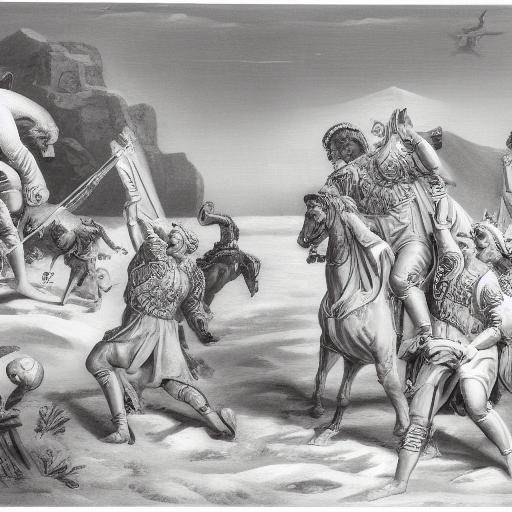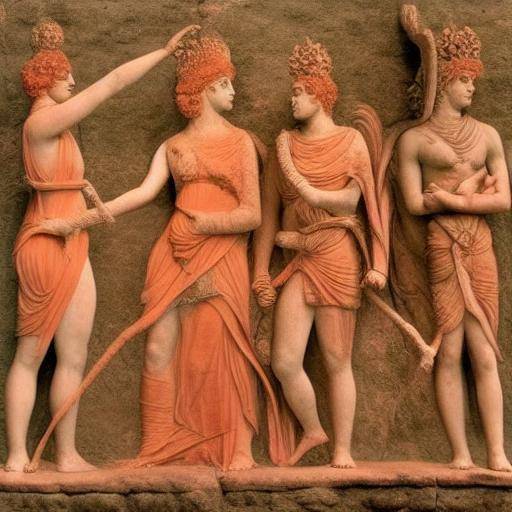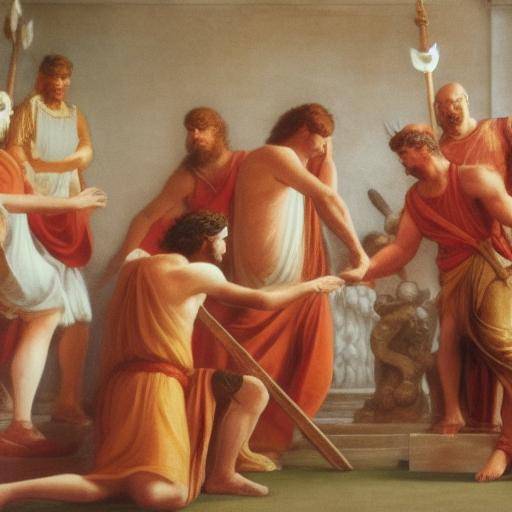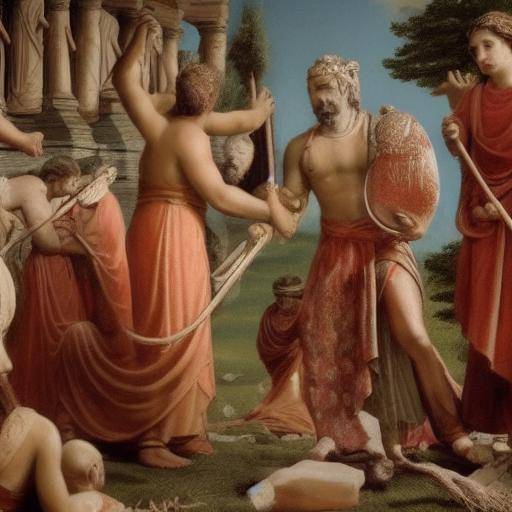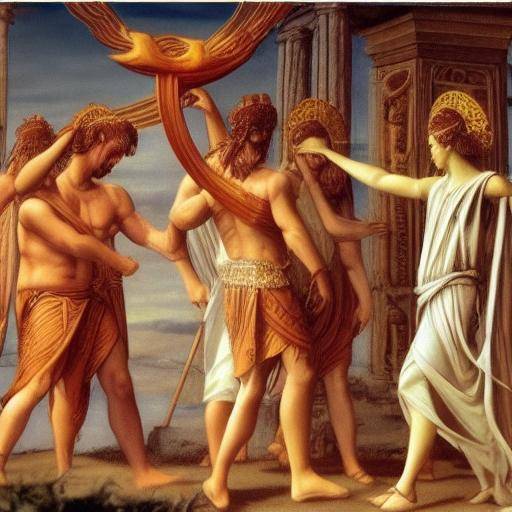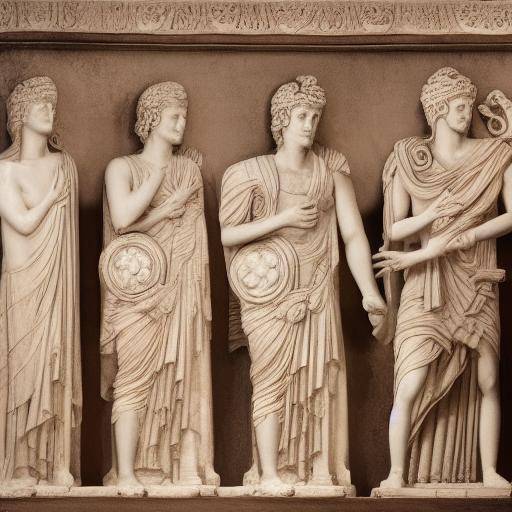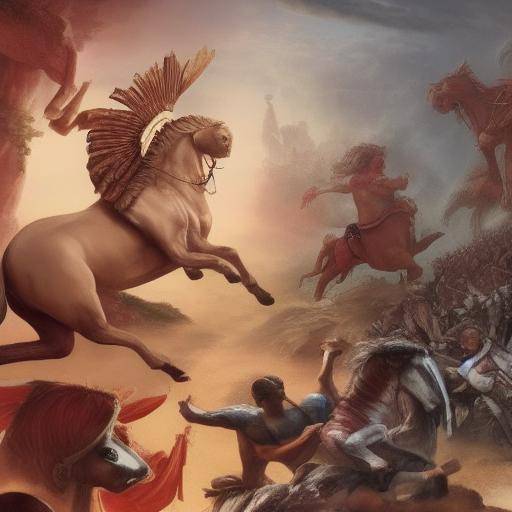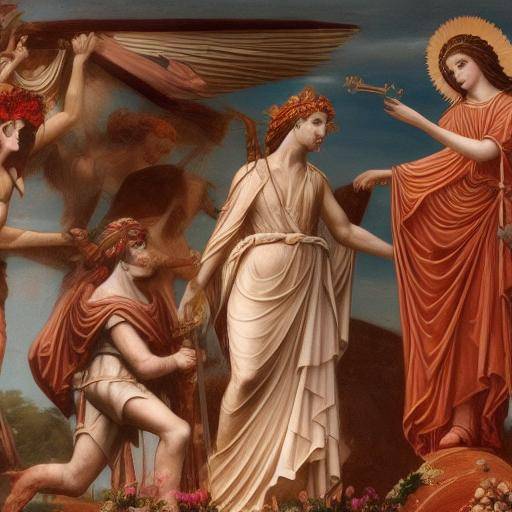
Greek mythology is rich in tales of divine punishments, stories that exemplify heavenly justice and cosmic equilibrium. These fascinating narratives transport us to a world in which the gods and goddess decide the fate of mortals and semi-gods through punishments and revenge that transcend human understanding. In this article, we will explore in detail the divine punishments in Greek mythology, their relation to the concept of justice and the lessons that these timeless stories still offer us. Join us on this journey through mythology, divine justice and narratives that continue to fascinate entire generations.
Introduction
The stories of divine punishment in Greek mythology transcend mere entertainment, as they reflect values, cultural norms and concepts of justice rooted in ancient society. Through these stories, the Greeks conveyed moral teachings, warnings about human arrogance and the importance of respecting the gods. Moreover, these narratives offer a unique vision of justice, showing how deities intervened to restore balance when mortals transgressed divine laws.
Origins and Importance
Greek mythology, dated from 1200 BC, is one of the most influential traditions in western history. His stories have permeated literature, art and philosophy over the centuries. The Greek gods, with their complex network of interactions and relationships, embodied the deepest aspects of human behavior, including justice and its consequences.
In Greek mythology, divine justice manifested itself through punishments for educational and corrective purpose. Relatos like that of Prometheus chained, who was condemned for stealing the fire of the gods and giving it to humans, illustrate the inexorability of divine justice and the need to respect the will of the gods.
Analysis in Deep
The medular concept of justice in Greek mythology was based on the idea of balance and retribution. The gods punished those who challenged their authority, either for excess pride, stubbornness, disobedience or disrespect. According to this logic, unjust acts should be rectified through proportional punishments, restoring cosmic harmony.
It is important to note that divine justice was not always instantaneous, often manifested in disproportionate appearance punishments but, in fact, they were the result of multiple accumulated transgressions over time. This late-justice principle serves as a reminder that, sooner or later, unfair acts will face the consequences.
Comprehensive review
In Greek mythology, divine punishments not only functioned as warning signs for mortals, but were also educational tools. Narcissus' accounts, punished for their vanity, or Tango, condemned to eternal trials and torments, teach fundamental lessons about the dangers of arrogance and contempt for the gods.
In addition, these stories offer valuable reflections on responsibility, respect and humility, intrinsic values to the Greek concept of justice. Through divine punishments, Greek mythology reminded us that human actions should be carefully weighed, as deities were attuned to each transgression.
Comparative analysis
The relationship between divine punishments, Greek mythology and justice transcends antiquity, finding echoes in various cultural and religious manifestations throughout history. Parallel to similar concepts present in other cultures offer a fascinating comparative study of how human societies have addressed the idea of divine justice over time. These similarities and differences reveal the complex intersections between faith, morals and justice in various traditions.
In Greek mythology, divine justice represents the intervention of the gods to restore the lost balance. This balance is fundamental, as it holds the order of the universe. Divine punishments serve as a reminder that human behavior has consequences and that discord with the divine is not unpunished.
Practical Tips and Accessible Tips
Greek mythology offers us valuable lessons on justice, responsibility and the consequences of our actions. Inspired by these teachings, we can reflect on our own behavior, considering how our actions affect not only our lives, but also the balance of the world in which we live.
Some practical tips that we can draw from the stories of divine punishments in Greek mythology include:
- To cultivate humility and respect for higher forces.
- Reflect on our actions and their possible consequences.
- Recognizing that impulsive decisions may have lasting implications.
Industry Perspectives and Expert Reviews
Experts in Greek mythology, philosophy and theology have extensively addressed the concept of divine justice and the punishments applied by the gods in mythology. Their interpretations offer enriching perspectives on the continuing relevance of these stories, as well as their impact on the moral and ethical thinking of society.
The analysis of experts in different fields shows the extent and depth of the lessons that Greek mythology offers in relation to justice and divine punishments. The opinions of scholars and scholars in these areas add layers of meaning and complexity to the narratives that have endured over the centuries.
Case Studies and Real Life Applications
The lessons learned from Greek mythology continue to apply today. Parallelisms between divine punishments and contemporary conceptions of justice offer an opportunity to reflect on the ethical and legal principles that govern our society. In addition, the practical application of these teachings in modern contexts demonstrates their continued relevance.
Case studies that connect the stories of divine punishment in Greek mythology with contemporary situations and dilemmas provide a deeper understanding of the transcendence of these narratives. These connections show that the lessons of justice and the consequences of human actions are timeless.
Future Trends and Predictions
The importance of narratives that address justice, morality and the consequences of our actions will remain relevant in the future. As societies evolve, new interpretations of the stories of divine punishments in Greek mythology will emerge, enriching the collective understanding of justice.
The ability of the stories of divine punishments in Greek mythology to adapt to contemporary contexts and address emerging ethical and moral challenges ensures that these narratives remain relevant. Future trends point towards a continuation of the exploration and reinterpretation of these stories in the context of justice and morality.
Conclusion
The stories of divine punishment in Greek mythology offer us a unique perspective on justice, morality and balance in the cosmos. Through captivating narratives, these stories transcend time and continue to challenge current generations to reflect on the consequences of their actions. The importance of these timeless lessons highlights the continuing relevance of Greek mythology in the understanding of justice and morals. In exploring these accounts, we immerse ourselves in a world of gods and mortals, full of teachings about human nature and the importance of divine justice.
Frequently asked questions
1. What is the importance of studying the stories of divine punishment in Greek mythology in the current context?
The stories of divine punishment in Greek mythology offer timeless teachings about justice, morality and the consequences of our actions. Its relevance extends to the understanding of the ethical and legal principles that govern our contemporary society.
2. What parallels can be established between divine punishments in Greek mythology and contemporary conceptions of justice?
Parallelisms are found in the notion that human actions have consequences, and that justice is manifested through the restoration of the lost balance. In addition, both address the idea that impulsive decisions may have lasting implications.
3. What practical lessons can we draw from the stories of divine punishments in Greek mythology to apply in our daily lives?
To cultivate humility and respect for higher forces, reflect on our actions and their possible consequences, and recognize that our decisions can have lasting impacts are some of the practical lessons we can draw from these stories.
4. How do these stories influence contemporary jurisprudence and theology?
The stories of divine punishment in Greek mythology have been studied and influenced by contemporary jurisprudence and theology, providing a basis for development and reflection around concepts of justice, morality and balance in the cosmos.
5. What relevance do modern interpretations of these stories have in relation to justice and morality?
The modern interpretations of these stories offer an opportunity to reflect on the ethical and legal principles that govern our society, highlighting the significance of mythological narratives in the understanding of justice and morality.
6. How can these narratives contribute to our understanding of the balance in the cosmos and the relationship between gods and mortals?
The stories of divine punishment in Greek mythology offer a unique vision of interactions between gods and mortals, highlighting the importance of balance in the cosmos and the consequences of human transgressions.
With the exploration of these frequent questions, we broaden our understanding of the importance and implications of the stories of divine punishment in Greek mythology, as well as its relevance in the reflection on justice and morality in the present world.
In short, the stories of divine punishment in Greek mythology not only captivate us with their fascinating stories, but also offer us valuable lessons on justice, responsibility and the consequences of our actions. Through the exploration of these timeless narratives, we are invited to reflect on our own relationship with justice and balance in the world we live in.




